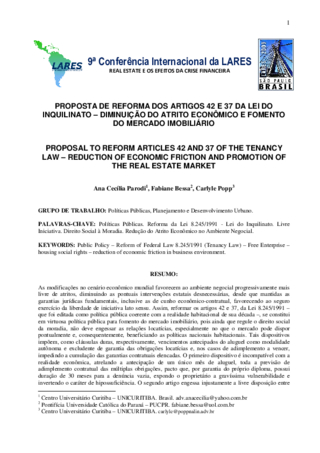As modificações no cenário econômico mundial favorecem ao ambiente negocial progressivamente mais livre de atritos, diminuindo as pontuais intervenções estatais desnecessárias, desde que mantidas as garantias jurídicas fundamentais, inclusive as de cunho econômico-contratual, favorecendo ao seguro exercício da liberdade de iniciativa lato sensu. Assim, reformar os artigos 42 e 37, da Lei 8.245/1991 – que foi editada como política pública coerente com a realidade habitacional de sua década –, se constitui em virtuosa política pública para fomento do mercado imobiliário, pois ainda que regule o direito social da moradia, não deve engessar as relações locatícias, especialmente no que o mercado pode dispor pontualmente e, consequentemente, beneficiando as políticas nacionais habitacionais. Tais dispositivos impõem, como cláusulas duras, respectivamente, vencimentos antecipados do aluguel como modalidade autônoma e excludente de garantia das obrigações locatícias e, nos casos de adimplemento a vencer, impedindo a cumulação das garantias contratuais elencadas. O primeiro dispositivo é incompatível com a realidade econômica, atrelando a antecipação de um único mês de aluguel, toda a previsão de adimplemento contratual das múltiplas obrigações, pacto que, por garantia do próprio diploma, possui duração de 30 meses para a denúncia vazia, expondo o proprietário a gravíssima vulnerabilidade e invertendo o caráter de hipossuficiência. O segundo artigo engessa injustamente a livre disposição entre as partes, que bem poderiam contratar a duplicidade de garantias, desde que condicionadas percentualmente à repartição proporcional obrigacional. Aumenta a relevância dessa reforma legislativa se consideradas as imposições do mercado para o garantidor, afunilando, crescentemente, a possibilidade de sua identificação no círculo social-familiar do locatário. Pelo processo investigativo e propositivo se demonstrará a inadequação econômico-temporal dos artigos mencionados, bem como, elaborando sugestão de novos caminhos legislativos para os mesmos, sem prejuízo do arcabouço protetivo a tutelar os inquilinos e ainda lhes favorecendo pelo potencial incremento da oferta imobiliária e das condições negociais.
The changes in the global economic environment are conducive to a business environment increasingly free of frictions, reducing the specific unnecessary state intervention, as long as the fundamental legal guarantees are maintained, including the ones of economic and contractual type, promoting the safe exercise of the free enterprise lato sensu. Thus, reforming Articles 42 and 37 of Law 8245/1991 – which was originally drafted as a public policy consistent with the reality of housing in its decade – comes to be a virtuous public policy to stimulate the real estate market, for even though it regulates the housing social right, it must not paralyse the tenancy relationships, especially regarding what the market can specific contract by itself and, consequently, benefit the national housing policy. Such devices require, as hard clauses, respectively, the advanced payments of rent as an autonomous and exculpatory formality for the guarantee of the tenant obligations and, in cases of payment which have not yet expired, impeding the accumulation of the listed contractual guarantees. The first device is incompatible with the economic reality, enforcing with the advanced payment of one month's rent, the preview of contractual fulfilment of multiple obligations, an agreement that for the guarantee of the Federal Law itself, is meant usually for at least thirty months, in name of the best legal guarantees, exposing the owner to serious vulnerability and reversing the character of “hypo-sufficiency”. The second article is unfairly an obstacle to the free negotiation between the parties, who could hire the double of guarantees, provided that they are proportionally subject to the obligational distribution. The importance of this legislative reform significantly increases as the market charges for the guarantor are considered, reducing the possibility of their identification in the social and family circle of the tenant. Through an investigative and purpose- built process, the economic and temporal mismatch of the referred articles will be demonstrated, as well, will be elaborated suggestions to develop new alternatives to such legislation, with no harm to the protective framework which protects tenants and benefit them by the potential increase in property supply and negotiating conditions.
